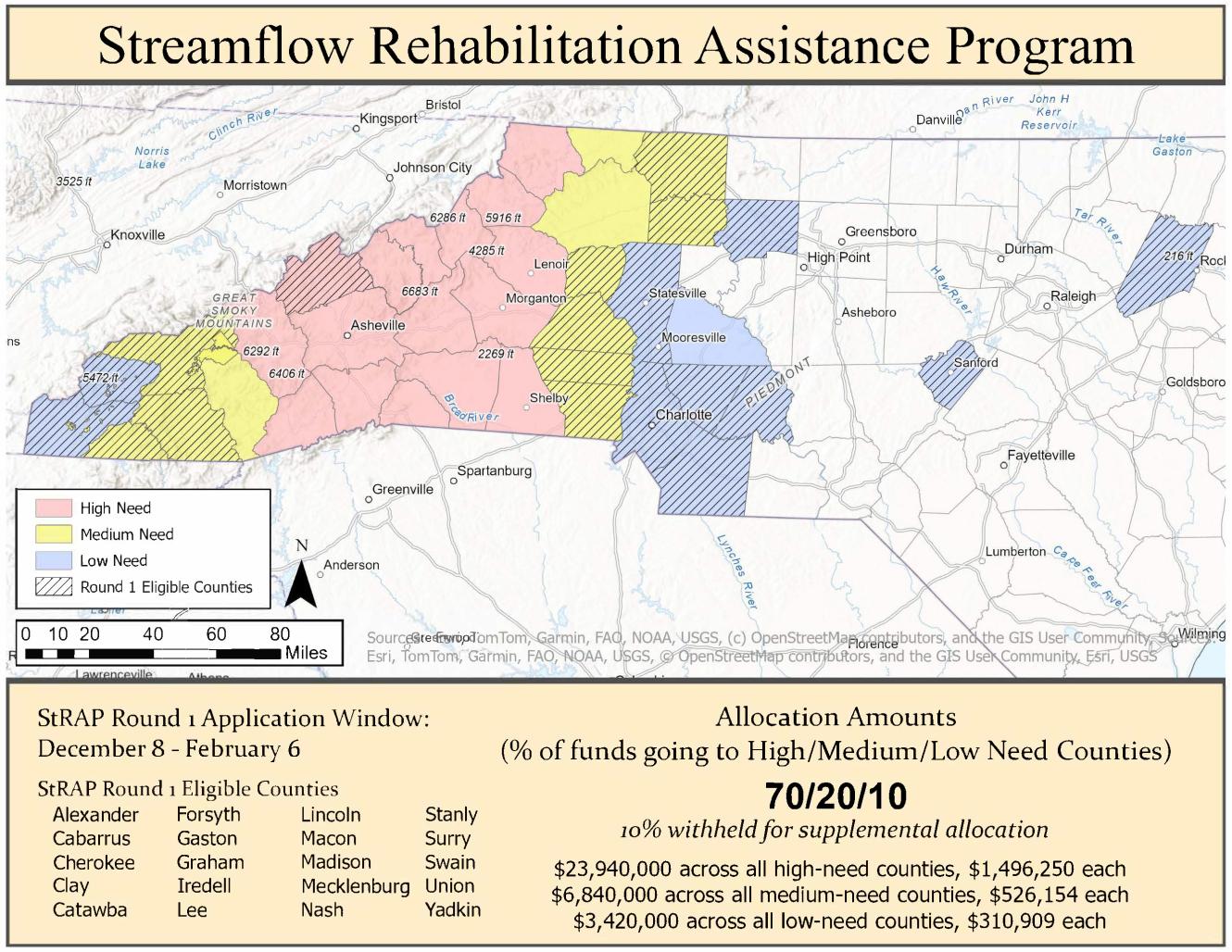
The Streamflow Rehabilitation Assistance Program (StRAP) provides funds to organizations working on projects that help reduce flooding, restore streams, and protect the integrity of drainage infrastructure across North Carolina’s waterways. Learn more about program requirements and specifications on the Tools for Grantees page.
Visit the StRAP Application page for more information on the current round of funding for counties impacted by Hurricane Helene.
The Streamflow Rehabilitation Assistance Program (StRAP) provides grants to projects that help reduce flooding by protecting and restoring the drainage infrastructure of North Carolina's waterways. The program was created by the NC General Assembly, which approved $38 million in funding for StRAP in the budget appropriations bill for the 2021-2022 fiscal year. The program is administered by the state’s Soil & Water Conservation Commission, working closely with the Division of Soil and Water Conservation within the NC Department of Agriculture and Consumer Services. The authorizing legislation for StRAP is available here.
- 2022 Awards: a total of $36.1 million was awarded to 111 organizations. A full list of grantees is available here.
- 2024 Awards: at total of $24.2 million was awarded to 110 organizations. A full list of grantees is available here.
StRAP funds projects that restore and protect drainage infrastructure of both natural streams and small watershed structural projects to prevent future flooding, restore streams, and reduce risks to life and property. StRAP funds may be used to provide nonfederal match for related disaster recovery activities funded by the federal government.
Projects eligible for StRAP funding include:
- Vegetative debris removal
- Instream sediment removal
- Streambank stabilization
- Stream restoration
- Repair and rehabilitation of P.L. 566 Small Watershed Structures
- Structural rehabilitation or replacement for critical components (ex: principal spillway, emergency spillway)
- Repair of critical eroding or settling areas
- Removal of accumulated sediment from the impoundment
The 2022 allocation of funds prioritized projects completing Vegetative Debris Removal and P.L. 566 Small Watershed Structure Repair.
Eligible organizations across North Carolina include:
- Soil and Water Conservation Districts
- City and County Governments
- Drainage Districts
- Water or Sewer authorities, municipal or county service districts, and sanitary districts
- Nonprofit organizations
Private citizens are not eligible to receive StRAP funds.
On December 8th, the Division of Soil & Water Conservation will begin accepting applications for StRAP in counties affected by Hurricane Helene. This allocation of funding will make $38 million available for projects to repair stream damage caused by Hurricane Helene. This follows approval by the Soil & Water Conservation Commission. Please visit the StRAP application page for more information on the program and eligible projects.
Read the full application announcement
A series of webinars will be held to provide additional information on this application cycle and guidance on completing applications. The first 2 webinars are:
· Tuesday, December 2nd at 10am- Join the meeting now
· Thursday, December 4th at 2pm- Join the meeting now

Matt Safford, StRAP Manager
NCDA&CS Division of Soil and Water Conservation
Office: 919-707-3784 Cell: 984-960-9168
matt.safford@ncagr.gov
Stephanie Alston, StRAP Admin Specialist
919-707-3773 stephanie.alston@ncagr.gov
Steven Porson, StRAP GIS Specialist
919-707-3781 steven.porson@ncagr.gov
Patty Gabriel, Inspection Coordinator
919-751-0976 x 5609 patricia.gabriel@usda.gov
